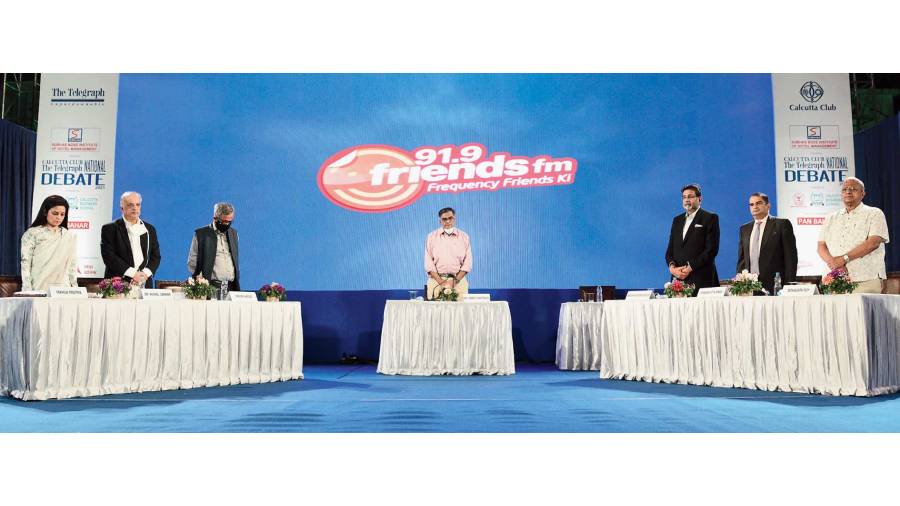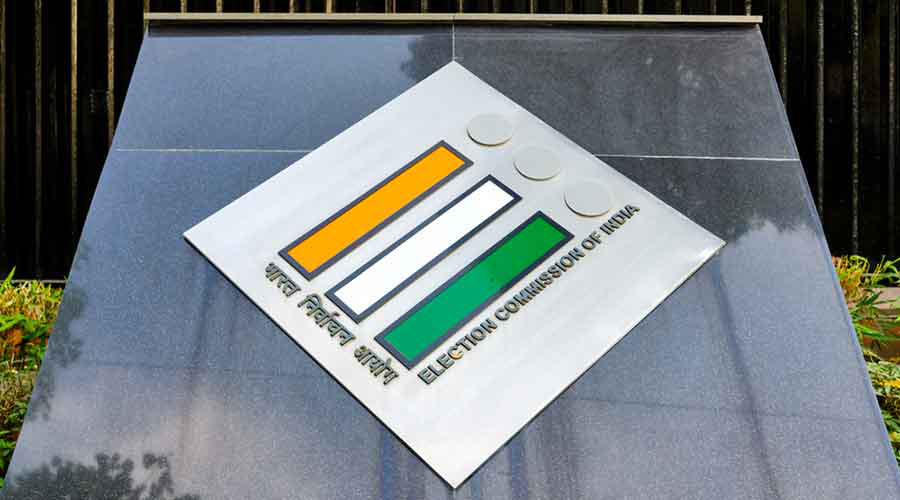If you are reading this as you head to Calcutta, Prime Minister, you might want to consider a rejig to your rhetoric on the Brigade Grounds this afternoon: your handling of the Covid pandemic has been pronounced a failure.
When the hands went up at the conclusion of the debate, the motion of the evening had won hands down.
At the Calcutta Club The Telegraph National Debate 2021, presented by Subhas Bose Institute of Hotel Management, powered by Calcutta Business School, a unit of Shikshayatan Foundation, in association with Pan Bahar, the motion went: “In the opinion of the house, in the year of the pandemic, India failed to balance lives with livelihood”.
As it turned out, the proposers of his botching of the sweeping humanitarian crisis didn’t require to stretch themselves; it was a contest won in facile fashion, so facile that Mahua Moitra felt obliged
to say sorry shots hadn’t been fired. It isn’t often she has to seek forgiveness for being short on gunpowder in her bandolier, but she was never provoked to the trigger in the first place.
“I apologise if the debate has turned out to be a bit of a damp squib,” Moitra said towards the end, already quite assured her side had the run of the floor.
It was never a fight, Prime Minister, your advocates tamely lost, with little more to offer than tatty whataboutery and dubious parading of numbers.
Economist Prasenjit Basu, who briefly promised to make a fist of it, became too absorbed in rubbishing Nehruvian socialism and schmoozing Modi’s New India to bring credibility to his argument.
“In Modi’s India,” Basu claimed to incredulous sighs rising from the back of the house, “every household has a clean toilet to use.... Modi’s India has actually strengthened the state of the economy, it has massively outperformed the world and Nehruvian history.”
He may have mistaken the stage and the day by a bit; Basu was probably imagining himself speaking from Modi’s Brigade dais to Modi’s audience with Modi listening in.
Sanjay Hegde, senior advocate at the Supreme Court and battler of many causes, drew first blood, accusing Modi of making the wrong decisions with the wrong people around and creating a situation where the “consequences of the virus will haunt us long after the virus has gone”.
When the pandemic was about to break, “everything was put on hold because we had to shout ‘Kemchho Trump’... we kept our airports open because we had to let people in for the jamboree… we did all sorts of unscientific drills like utensil banging”.
Hegde also flagged the qualities of good leadership and recalled Gen. Sam Manekshaw rebutting Indira Gandhi’s orders to prepare for a mid-monsoon war to liberate East Pakistan, arguing the season would be disastrous for waging battle. “Manekshaw said ‘no’, he argued he needed time and was given time. Is there anyone who can say ‘no’ to the current incumbent?”
It was a theme Dr Kunal Sarkar would later labour on too, saying the Prime Minister had surrounded himself with not the right men but with yes-men. Sardonic of mien as few can be, Sarkar also ribbed the Modi government on reacting late.
“We let the virus float in from the world over, we knew but lakhs of infected people came in.... Of course in Bengal we are foresighted people. Our leaders had taken measures to shut international flights years ago, we have been preparing for decades, we don’t have international flights barring Bangkok-Tangkok.…”
Real estate and hospitality magnate Harsh Neotia played the balancing game to near-perfection, clearly taking no risks to commit himself on the eve of the high-voltage battle for Bengal.
He was no politician, he clarified at the outset; he wasn’t going anywhere near tarrying with the torrid business of it.
“Team India has done well, and Bengal, which is part of Team India, has done better to help Indian averages,” was the burden of his calm and careful act; he has things off the evening to quote to Modi; he has things to quote to Mamata Banerjee.
His colleague on the opposing side, former Tripura and Meghalaya governor Tathagata Roy, came troubled with the proposition itself.
“How can lives be likened to livelihoods?” he asked to general bafflement. “What is the connection, one is a matter for doctors, the other the concern of economists, what is the connection, I cannot understand. This is wrong.”
Mahua Moitra, speaking grist ahead of Roy, had just defined the link. “Most poor people in this country do not have the luxury of staying at home and eating from home. A crisis is different for the rich and the poor. The binary between lives and livelihoods is false, for the poor their livelihood is their life, and it is that understanding, that dignity that the government has failed to display towards the poor,” she argued.
“In my district (Krishnagar) alone, three to four lakh migrants came back, and you know what they told me? ‘Didi, this pandemic will not kill us, hunger will’. That is where this government failed; in treating humans with dignity and providing for them, it failed spectacularly.”
Her opposing side, she’d have been pleased to note, failed even more spectacularly.


